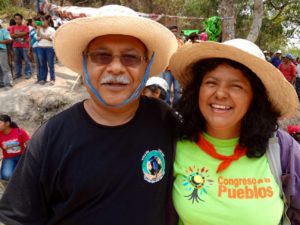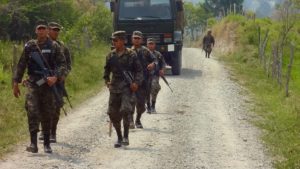Photos by Lucy Edwards
By Lucy Edwards
Berta Cáceres was indomitable, a powerful and fearless leader of a nonviolent struggle for indigenous and environmental rights in Honduras. She was also a mother, aunt, daughter and friend with an infectious smile that could light up the room or capture a stage. She was the leader of COPINH, an indigenous organization known for its active defense of the country’s land, environment, and indigenous rights. In 2015 she was awarded the prestigious international Goldman Prize for defense of the environment.
In the middle of the night of March 2-3, armed men stormed into the home of this internationally recognized Lenca leader, opened fire and killed her. But as a young friend reminded me, some women never die.
The Honduran people and the international solidarity, environmental and faith communities have responded with grief, shock, and protest. Berta Cáceres was the strong and prophetic voice for the sacred Gualcarque River, endangered by the Agua Zarca hydroelectric project that seeks to put two dozen dams on it.
The hydro project would provide “renewable energy” for mining projects. Since the 2009 coup d’etat, mining, dam projects and other mega-projects are proliferating in Honduras, with determined resistance from indigenous and other local communities whose land is expropriated, crops and homes destroyed, families displaced.
By law, this process of granting “concessions” for mining and dam building requires local input. Honduras is signatory to International Labor Organization Convention 169 that demands “free, prior, and informed consent” from local communities affected by such projects. But the Honduran government and national and foreign corporations routinely ignore the demands of law. They bribe a few locals and co-opt officials to rubber stamp the process. Then come the threats, intimidation, discrediting and violence against those who resist such “progress.”
Berta Cáceres and her organization COPINH knew all these manipulations and experienced constant threats. In 2013, she and a co-worker were arrested and jailed, accused of carrying a gun– an effort to discredit their nonviolent struggle. Charges were eventually dropped, but her work and her travels were disrupted by a process that required her to check in with regional officials every 15 days. The Inter-American Commission for Human Rights, an arm of the Organization of American States, had mandated the Honduran government provide protective measures for Cáceres and other threatened individuals. The government failed to investigate the source of the threats and instead used the mandate to intimidate Cáceres and other COPINH members.
Berta Cáceres is the murder we have heard about. But she is not alone. There are literally hundreds of others, ordinary and prominent who are simply defenders of life, land, environment, and rights in Honduras, threatened and killed for daring to defend such things. If they can kill Berta Cáceres so brazenly, the message is that they can kill anyone.
In the United States, we almost never notice Honduras, despite our country’s enormous investment of military and police equipment, training and “security assistance” that has been pouring into the Central American country since the 2009 coup d’etat. Yet in our daily lives, most of us benefit from extractive industries in Honduras–from foods to metals and minerals used in our cell phones and other devices. Our lives are bound up with the lives of Hondurans. The murder of Berta Cáceres should remind us of our debt to the people of Honduras and our need to change the policies and practices of our own government and corporations.
________________________
Lucy Josselyn Edwards of Ashland, Oregon works in Central America as part of the Global Ministries Team of Ashland First Congregational United Church of Christ. In Honduras she works with Proah, the Honduras Accompaniment Project. She met Berta Cáceres while accompanying Honduran Jesuit Padre Melo.
________________________
Advocacy Actions
Contact your Congressional Representative with regarding the murder of Honduran indigenous leader Berta Cáceres and demand:
1) Independent impartial investigation to determine the material and intellectual authors of the crime that includes a cooperation agreement with the Inter American Commission on Human Rights to allow international experts to participate in the investigation, and other pertinent Human Rights bodies.
2) Government of Honduras must allow that FAFG (Fundación de Antropología Forense de Guatemala) to review the autopsy report and issue findings regarding that report that the family can have access to.
3) Suspension of US support for Honduran security forces, including the US trained 1st Battalion.
4) Suspension of Multilateral development bank funding to Honduran private sector because the governance conditions are not adequate to insure gross human rights violations do not occur.
5) Cancellation of the concession of the Gualcarque River to DESA so that the river remains free.




